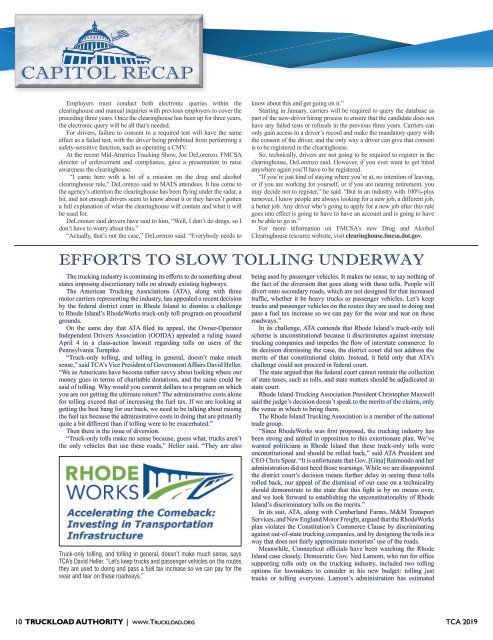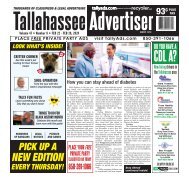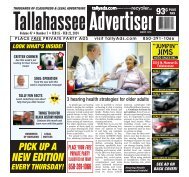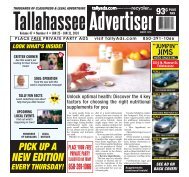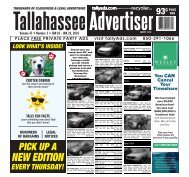Truckload Authority - April/May 2019
You also want an ePaper? Increase the reach of your titles
YUMPU automatically turns print PDFs into web optimized ePapers that Google loves.
CapItol recap<br />
Employers must conduct both electronic queries within the<br />
clearinghouse and manual inquiries with previous employers to cover the<br />
preceding three years. Once the clearinghouse has been up for three years,<br />
the electronic query will be all that’s needed.<br />
For drivers, failure to consent to a required test will have the same<br />
effect as a failed test, with the driver being prohibited from performing a<br />
safety-sensitive function, such as operating a CMV.<br />
At the recent Mid-America Trucking Show, Joe DeLorenzo, FMCSA<br />
director of enforcement and compliance, gave a presentation to raise<br />
awareness the clearinghouse.<br />
“I came here with a bit of a mission on the drug and alcohol<br />
clearinghouse rule,” DeLorenzo said to MATS attendees. It has come to<br />
the agency’s attention the clearinghouse has been flying under the radar, a<br />
bit, and not enough drivers seem to know about it or they haven’t gotten<br />
a full explanation of what the clearinghouse will contain and what it will<br />
be used for.<br />
DeLorenzo said drivers have said to him, “Well, I don’t do drugs, so I<br />
don’t have to worry about this.”<br />
“Actually, that’s not the case,” DeLorenzo said. “Everybody needs to<br />
know about this and get going on it.”<br />
Starting in January, carriers will be required to query the database as<br />
part of the new-driver hiring process to ensure that the candidate does not<br />
have any failed tests or refusals in the previous three years. Carriers can<br />
only gain access to a driver’s record and make the mandatory query with<br />
the consent of the driver, and the only way a driver can give that consent<br />
is to be registered in the clearinghouse.<br />
So, technically, drivers are not going to be required to register in the<br />
clearinghouse, DeLorenzo said. However, if you ever want to get hired<br />
anywhere again you’ll have to be registered.<br />
“If you’re just kind of staying where you’re at, no intention of leaving,<br />
or if you are working for yourself, or if you are nearing retirement, you<br />
may decide not to register,” he said. “But in an industry with 100%-plus<br />
turnover, I know people are always looking for a new job, a different job,<br />
a better job. Any driver who’s going to apply for a new job after this rule<br />
goes into effect is going to have to have an account and is going to have<br />
to be able to go in.”<br />
For more information on FMCSA’s new Drug and Alcohol<br />
Clearinghouse resource website, visit clearinghouse.fmcsa.dot.gov.<br />
Efforts to slow tolling underway<br />
The trucking industry is continuing its efforts to do something about<br />
states imposing discretionary tolls on already existing highways.<br />
The American Trucking Associations (ATA), along with three<br />
motor carriers representing the industry, has appealed a recent decision<br />
by the federal district court in Rhode Island to dismiss a challenge<br />
to Rhode Island’s RhodeWorks truck-only toll program on procedural<br />
grounds.<br />
On the same day that ATA filed its appeal, the Owner-Operator<br />
Independent Drivers Association (OOIDA) appealed a ruling issued<br />
<strong>April</strong> 4 in a class-action lawsuit regarding tolls on users of the<br />
Pennsylvania Turnpike.<br />
“Truck-only tolling, and tolling in general, doesn’t make much<br />
sense,” said TCA’s Vice President of Government Affairs David Heller.<br />
“We as Americans have become rather savvy about looking where our<br />
money goes in terms of charitable donations, and the same could be<br />
said of tolling. Why would you commit dollars to a program on which<br />
you are not getting the ultimate return? The administrative costs alone<br />
for tolling exceed that of increasing the fuel tax. If we are looking at<br />
getting the best bang for our buck, we need to be talking about raising<br />
the fuel tax because the administrative costs in doing that are primarily<br />
quite a bit different than if tolling were to be exacerbated.”<br />
Then there is the issue of diversion.<br />
“Truck-only tolls make no sense because, guess what, trucks aren’t<br />
the only vehicles that use these roads,” Heller said. “They are also<br />
Truck-only tolling, and tolling in general, doesn’t make much sense, says<br />
TCA’s David Heller. “Let’s keep trucks and passenger vehicles on the routes<br />
they are used to doing and pass a fuel tax increase so we can pay for the<br />
wear and tear on these roadways.”<br />
being used by passenger vehicles. It makes no sense, to say nothing of<br />
the fact of the diversion that goes along with these tolls. People will<br />
divert onto secondary roads, which are not designed for that increased<br />
traffic, whether it be heavy trucks or passenger vehicles. Let’s keep<br />
trucks and passenger vehicles on the routes they are used to doing and<br />
pass a fuel tax increase so we can pay for the wear and tear on these<br />
roadways.”<br />
In its challenge, ATA contends that Rhode Island’s truck-only toll<br />
scheme is unconstitutional because it discriminates against interstate<br />
trucking companies and impedes the flow of interstate commerce. In<br />
its decision dismissing the case, the district court did not address the<br />
merits of that constitutional claim. Instead, it held only that ATA’s<br />
challenge could not proceed in federal court.<br />
The state argued that the federal court cannot restrain the collection<br />
of state taxes, such as tolls, and state matters should be adjudicated in<br />
state court.<br />
Rhode Island Trucking Association President Christopher Maxwell<br />
said the judge’s decision doesn’t speak to the merits of the claims, only<br />
the venue in which to bring them.<br />
The Rhode Island Trucking Association is a member of the national<br />
trade group.<br />
“Since RhodeWorks was first proposed, the trucking industry has<br />
been strong and united in opposition to this extortionate plan. We’ve<br />
warned politicians in Rhode Island that these truck-only tolls were<br />
unconstitutional and should be rolled back,” said ATA President and<br />
CEO Chris Spear. “It is unfortunate that Gov. [Gina] Raimondo and her<br />
administration did not heed those warnings. While we are disappointed<br />
the district court’s decision means further delay in seeing these tolls<br />
rolled back, our appeal of the dismissal of our case on a technicality<br />
should demonstrate to the state that this fight is by no means over,<br />
and we look forward to establishing the unconstitutionality of Rhode<br />
Island’s discriminatory tolls on the merits.”<br />
In its suit, ATA, along with Cumberland Farms, M&M Transport<br />
Services, and New England Motor Freight, argued that the RhodeWorks<br />
plan violates the Constitution’s Commerce Clause by discriminating<br />
against out-of-state trucking companies, and by designing the tolls in a<br />
way that does not fairly approximate motorists’ use of the roads.<br />
Meanwhile, Connecticut officials have been watching the Rhode<br />
Island case closely. Democratic Gov. Ned Lamont, who ran for office<br />
supporting tolls only on the trucking industry, included two tolling<br />
options for lawmakers to consider in his new budget: tolling just<br />
trucks or tolling everyone. Lamont’s administration has estimated<br />
10 <strong>Truckload</strong> <strong>Authority</strong> | www.<strong>Truckload</strong>.org TCA <strong>2019</strong>


